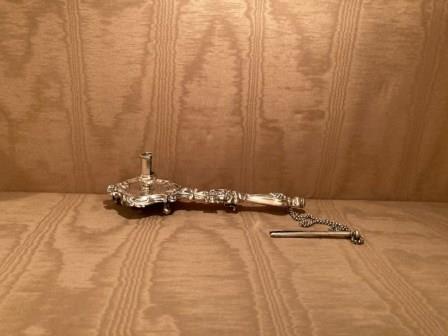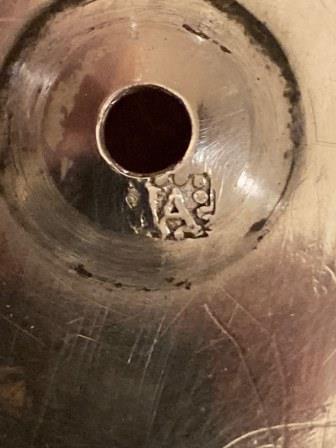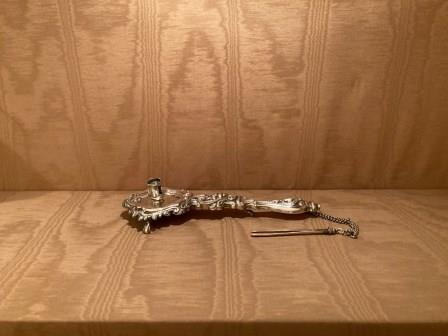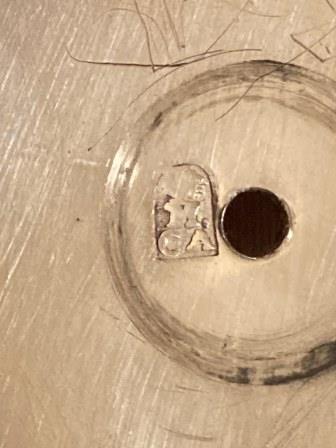I would like help identifying two Spanish silversmith marks placed in two different ecclesiastical chamber sticks (palmatoria).
They are items from the mid-18th century, without city marks.
https://dc687.4shared.com/img/aa-M7wcok ... 0004251157
https://dc687.4shared.com/img/Z2jmXPR7k ... 6638211309
Thank you
Spanish Marks
Re: Spanish Marks
Hi,
Welcome to the Forum.
Please embed your images as very few members will click on such links.
https://postimages.org (choose 'Share', then copy the 'Hotlink for forums' code) is recommended. Do not use Photobucket or Dropbox.
Trev.
Welcome to the Forum.
Please embed your images as very few members will click on such links.
https://postimages.org (choose 'Share', then copy the 'Hotlink for forums' code) is recommended. Do not use Photobucket or Dropbox.
Trev.
Re: Spanish Marks
This is the city mark of the Spanish city of Palma de Mallorca. Late 18th century.
Best regards.
Se trata de la marca de la ciudad española de Palma de Mallorca. Finales del XVIII.
Saludos.
Best regards.
Se trata de la marca de la ciudad española de Palma de Mallorca. Finales del XVIII.
Saludos.
Re: Spanish Marks
Gracias,
Thank you very much.
Is it common for only the city mark to appear without the silversmith's mark?
The mark on the other piece looks like an A surrounded by dots.
Could that also be a city mark?
Thank you very much.
Is it common for only the city mark to appear without the silversmith's mark?
The mark on the other piece looks like an A surrounded by dots.
Could that also be a city mark?
Re: Spanish Marks
Hello, good afternoon. Until the 20th century, it was mandatory to mark pieces with three hallmarks: maker, assayer, and city. The problem is that many silversmiths didn't do so, either because they didn't pay taxes or because they didn't go to the assayer. Indeed, the MA mark surrounded by dots is also from Palma de Mallorca and predates the other one.
Regards
Hola buenas tardes. Hasta el siglo XX , era obligatorio marcar las piezas con tres punzones, autor, ensayador y ciudad. El problema esta en que muchos plateros no lo hacian, bien por no pagar impuestos o por no ir al ensayador. Efectivamente la marca MA rodeada de puntos, tambien es de Palma de Mallorca y es anterior a la otra.
Saludos
Regards
Hola buenas tardes. Hasta el siglo XX , era obligatorio marcar las piezas con tres punzones, autor, ensayador y ciudad. El problema esta en que muchos plateros no lo hacian, bien por no pagar impuestos o por no ir al ensayador. Efectivamente la marca MA rodeada de puntos, tambien es de Palma de Mallorca y es anterior a la otra.
Saludos
Re: Spanish Marks
Thank you very much once again.
I assume that both are city marks from Mallorca.
Can you be more specific about the dates?
I have tried unsuccessfully to find access to a Spanish marks catalogue online.
In Portugal, only the city assay mark and the silversmith's mark were used.
On pieces intended for the church, when there is only one mark, it is usually the silversmith's mark.
I assume that both are city marks from Mallorca.
Can you be more specific about the dates?
I have tried unsuccessfully to find access to a Spanish marks catalogue online.
In Portugal, only the city assay mark and the silversmith's mark were used.
On pieces intended for the church, when there is only one mark, it is usually the silversmith's mark.
Re: Spanish Marks
Answering your questions:
Both marks are from Palma de Mallorca,
late 18th century.
It's true that in Portugal, only the mark of the city and the silversmith's quality are used.
You can find all kinds of things on church pieces, and many of them are unmarked. There's a lot of roguery in Spain, and avoiding taxes is almost a sport. :-)
Contestando a tus preguntas:
Las dos marcas son de Palma de Mallorca
Finales del XVIII.
Cierto en Portugal solo se usan la marca de ciudad y calidad de la plata y la del platero.
En las piezas de iglesia te puedes encontrar de todo y muchísimas de ellas sin ninguna marca. En España hay mucha picaresca y evitar el fisco es casi un deporte. :-)
Both marks are from Palma de Mallorca,
late 18th century.
It's true that in Portugal, only the mark of the city and the silversmith's quality are used.
You can find all kinds of things on church pieces, and many of them are unmarked. There's a lot of roguery in Spain, and avoiding taxes is almost a sport. :-)
Contestando a tus preguntas:
Las dos marcas son de Palma de Mallorca
Finales del XVIII.
Cierto en Portugal solo se usan la marca de ciudad y calidad de la plata y la del platero.
En las piezas de iglesia te puedes encontrar de todo y muchísimas de ellas sin ninguna marca. En España hay mucha picaresca y evitar el fisco es casi un deporte. :-)



